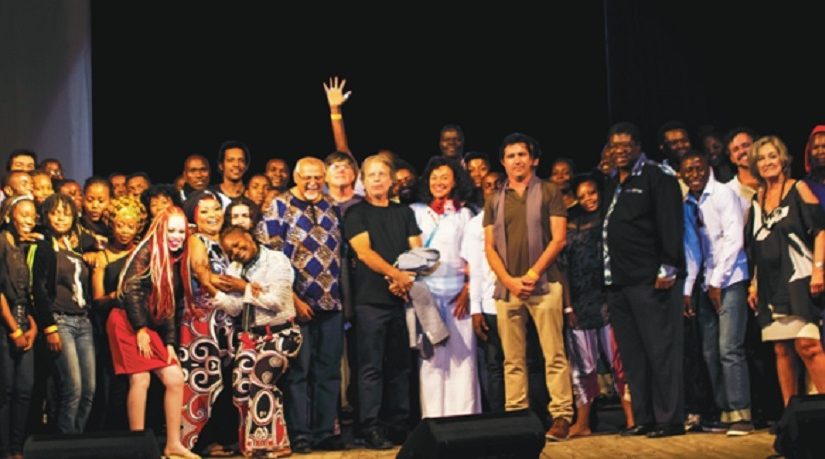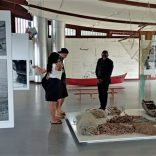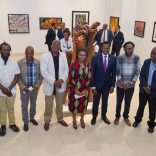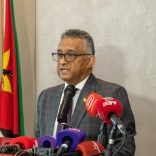Mozambique: Maputo's Museum of the Sea displays Osaka Expo content
TP50: Among friends, and with song

Courtesy photo: Instituto Camões Maputo
At a time of a socioeconomic crisis and with a destabilising war tearing the nation apart, it was culture that provided the light at the end of the tunnel for Mozambique, and the prospect of a smiling, if tenuous, future.
And there were people, too, who found in the arts a means of cultivating hope. Out of this context emerged TP50, a group of friends united for the sole purpose of singing love for life, culture and their homeland.
These are the stories that will be sung today and tomorrow at the Franco-Mozambican Cultural Centre in Maputo.
While chaos reigned in the newborn Mozambique of the 80s, a group of artistic dreamers got together on Saturdays with what little they could muster, to dive into nights of laughter, music, tape recorders and the building of hope.
Among the guitarists and percussionists there were Hortêncio Langa, Joel Libombo, Eben Chonguiça, Aaron Listsuri, António Prista, Yola, Harun, Marmelo, Carmen, Carmo, Armando, Paula, Gucha, Manuela Soeiro, Abel Cardoso and Rafton Leão.
“The main thing, however, was that the music was played and sung by everyone, because what counted was participation,” reads a TP50 presentation document.
While the adults played, there were many children, now themselves adults. Among them were Xixel and Texito Langa, Cherba, Bruno Uca, Ruben …
The songs included Mozambican hits, the revolutionary songs of the time, Portuguese songs of intervention and the bossa nova of Brazil – all in consonance with a time of hope in which people sincerely believed in building a humane and supportive country.
“This was a baby that we created in the 80s. When there was little else, we got together to have fun, to sing and tell jokes and share laughs,” former minister of Youth and Sports Joel Libombo recalls with pride in his eyes.
These meetings forged a group of friends, a family indeed, and a milestone in the lives of its participants.
Tó Prista = TP … And 50 recalls a certain birthday party
One of these family members, Antonio Prista, about to turn 50, with the help of Hortêncio Langa and Ciro Pereira, organized a group of young musicians unacquainted with the times and participants, to honour in music the people who had left their mark on his life.
Without any pretensions to the project it later became, in six months they put together the tribute that culminated in the Costa do Sol spectacle of 2007 in Maputo.
Afterwards, these same musicians, without the presence of the birthday boy, formed a band. As they met for the anniversary of Antonio, known to his closest friends as Tó (T) Prista (P), they called the band TP50.
And never again did they leave the stage
This taste for tributes ended up indelibly stamped on the band’s essence, such that a second spectacle, honouring Portuguese playwright and poet, Gil Vicente, author of “Auto da Barca do Inferno”, soon followed.
Following this, it was Maputo’s turn, celebrated on the city’s 120th anniversary in a concert at the Marítimo club.
In its next phase, TP50 was to become associated with bossa nova, with thematic tributes from 2008 to 2010 to Brazilians Tom Jobim, Elis Regina, Vinicius de Morais, and, above all, Chico César, one of the major figures of Brazilian popular music and author of the classic “Construção”.
“The members of the band played other musical genres, but they all had an interest in bossa nova, which came through in their shows,” said António Prista at the opening of the photographic exhibition illustrating the group’s journey since the 1980s.
Hortêncio Langa’s sixtieth birthday in 2011 was the second opportunity to bow in the direction of another member of this group, which today sports more than 60 members.
“[António] Prista already had the idea of doing themed concerts of Mozambican music, so this was an opportunity,” said the author of “Mayvavo”. He explains that it was a surprise event organised with the collusion of his sons, Xixel and Texito, themselves project musicians. Both are collecting old photos of their father as part of the “plot”.
By that time, the spectacles involved theatre and the dance too, but done in a sometimes deliberately amateur, so as not to lose the homemade and acoustic feel of its origins.
Poetry and prose never lacked in the original menu, with poetry readings always part of the mix. In this spirit, the collective put on “Olhar Moçambique”, a tribute to the writer Calane da Silva, which generated such an emotional concert at the CCFM in 2015.
The tributes to Mozambican musicians were perhaps never more than vehicles for relating the country’s diverse narratives, most apparent in the “Croniconto” tribute to Mia Couto.
Notícias described the August 8, 2016, show at the Eduardo Mondlane University Cultural Centre as a curatorship, built on the writer’s texts, of a repertoire that followed the chronology of Mozambique itself, from the colonial period to present day.
The selection of this itinerary was also due, Prista said, to a desire to “transmit values through culture at a time of crisis”, adding: “We use this path to tell the country’s history with recourse to some of the characters who have stood out by their work and conduct, by the example of who they are.”
It was also in this educational sense that TP50 this year released an album in homage to Tio Turutão, the Rádio Moçambique radio broadcaster who mentored and produced many children’s programmes. A press release at the time said the album was a way addressing the current paucity of children’s music in Mozambique.
The concert at the CCFM tonight will launch the group’s second disc, “Saravah: 10 years with TP50”. The acoustic set, recorded live, explores diverse elements of Mozambican popular music, and includes excerpts of text read by Mia Couto at the show in his honour and poems recited by Calane da Silva.
By Leonel Matusse Jr
- For these two concerts we will also have the participation of artists from Portugal and Brazil, in particular: Maria João and João Farinha (Portugal), Guilherme Sparapan, Sérgio Castanheira, Manoela Pamploma, Santiado Galdino and Julian Malhães (Brazil). and Eduardo Mondlane University group As Marias.
- Friday, September 15 & Saturday September 16 at 8:30 p.m.
- Big Hall | 500MT / 400MT
- Centro Cultural Franco-Moçambicano, Avenida Samora Machel, nº468













Leave a Reply
Be the First to Comment!
You must be logged in to post a comment.
You must be logged in to post a comment.